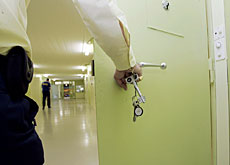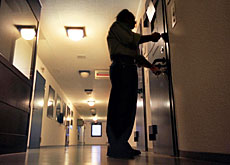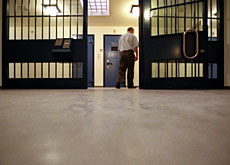Parliament wants violent offenders law

The House of Representatives has approved a controversial draft law that calls for the lifelong incarceration of very dangerous criminals.
The Swiss population voted in favour of the move three years ago, but opponents have argued that it goes against the European Convention on Human Rights.
The proposal calls for violent offenders to be locked up for life without the possibility of parole, if a psychological assessment decides that they cannot be cured.
A parliamentary committee that had examined the law had recommended rejecting it, raising doubts over its compatibility with international legislation, especially over the parole issue.
Finding a middle way between respecting the population’s wishes and the rule of law was a “mission impossible”, a committee spokeswoman said on Monday.
But an alliance of rightwing parties, including the Swiss People’s Party, with support from some centre-right Christian Democrats, managed to push the proposal through the bigger chamber of parliament, arguing that it was possible to protect the public and respect human rights.
By approving the initiative for lifelong incarceration of dangerous criminals and sex offenders considered untreatable, the population had shown that it wanted to find ways of preventing such tragedies as the murders of children, said People’s Party President Ueli Maurer.
Others argued that because of Switzerland’s system of direct democracy the will of the people should always be followed, even if not everyone agreed upon it.
Justice minister and People’s Party leading figure Christoph Blocher had also supported the draft law for the same reasons. He said the authorities would have to guarantee that Swiss legislation was compatible with the human rights convention.
Doubts raised
Opponents, which included parties to the left of the political spectrum, maintained that there was already legislation in place to deal with such criminals and that it was not necessary to “play with” international law to ensure the protection of the population.
Some went further, pointing to a possible series of conflicts with the European Court of Human Rights as a consequence.
“The rule of law is not made out of rubber which you can bend in all directions,” said Carlo Sommaruga, of the centre-left Social Democrats.
The proposal has now gone back to the committee where it will be reconsidered.
The population voted in favour of the initiative in 2004, in what was considered a firm rebuke to parliament and the government, which at that time had rejected the move as too harsh.
Some observers were surprised that the initiative, which was put forward by a group representing victims and their families, had passed despite having so little financial and political support.
The initiative was triggered by a number of cases in the 1980s and 90s of murders and rapists reoffending during weekend leave from prison, or after being released.
swissinfo with agencies

More
People’s initiative
The people’s initiative was launched by a group of victims and families of victims in 1998.
They collected over 194,000 signatures – almost double the number required to submit an initiative – and handed them over in 2000.
The initiative called for a single psychological assessment of the risk an offender presents to society.
Both the government (2001) and parliament (2003) rejected the proposals it contained.
But voters accepted the initiative in February 2004.
On Monday the House of Representative approved making the initiative law.

In compliance with the JTI standards
More: SWI swissinfo.ch certified by the Journalism Trust Initiative



You can find an overview of ongoing debates with our journalists here. Please join us!
If you want to start a conversation about a topic raised in this article or want to report factual errors, email us at english@swissinfo.ch.